By Maryam Maruf and Kanishk Tharoor
(BBC)- When Syria's civil war came to the city of Aleppo in 2012, Zahed Tajeddin was cut off from his 450-year-old home. He worried about it, but it survived - and he later discovered how it served as a life-saving medical centre for people living under constant bombardment.
Zahed Tajeddin had always wanted to live in Aleppo's historic old town, in one of the city's ancient houses, with a front door opening into a corridor that leads to courtyard with a fountain and jasmine climbing up the walls.
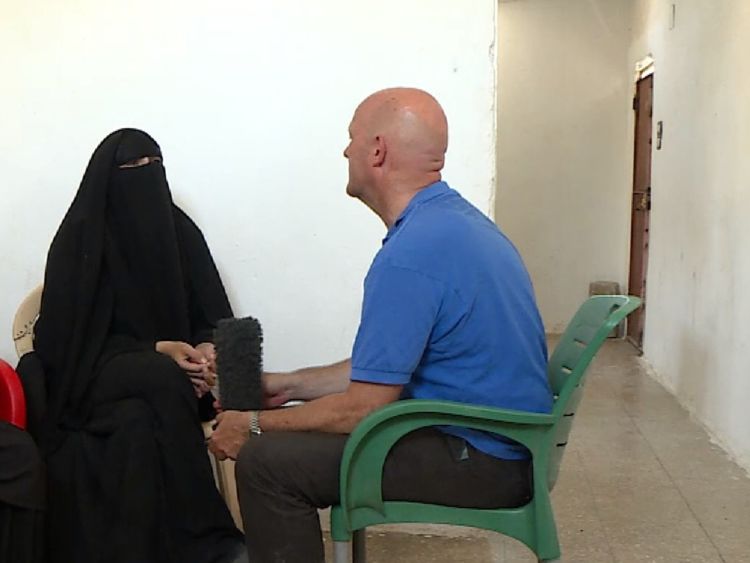
His father had been brought up in one, but Tajeddin himself had spent his childhood in a modern flat in a modern district of the city.
As a teenager, he would explore the old houses just before they were demolished, scampering through courtyards and over crumbling rooftops. He finally managed to buy one for himself, after making a career as a sculptor and archaeologist, in 2004.
He chose the neighbourhood of Judaydah, which means "little new quarter" in the local dialect. Although it started to take shape in the 15th Century, this was in fact "new" in a city with 6,000 years of continuous human habitation.
"For me that area was so special," Tajeddin says.
As well as the medieval mansions there were stone alleyways, squares, churches, mosques, coffeehouses - and the ever-present scent of flowers.
"You always have the smell of jasmine. It's typical of Aleppo streets," Zahed says. "It's a magical atmosphere."
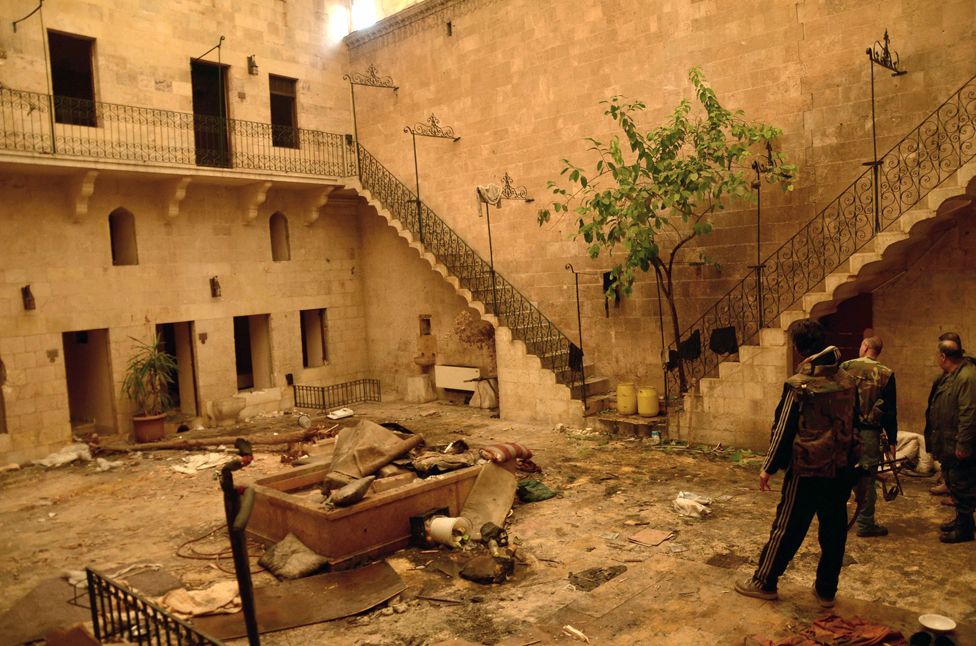
Tajeddin was living in London with his wife and children when the Syrian conflict began. He watched from afar as war engulfed Aleppo in 2012 and Judaydah became a battleground between government soldiers and opposition fighters.
"It was the most difficult thing being away and hearing the news. You try to chase what's going on," he says.
He searched obsessively online for any information. "One YouTube video shows a battle on my doorstep. So people fighting and screaming in my little street," he says.
Even more distressing was when his fragile 84-year-old father, trying to reach the house from his own home in government-held territory, was caught in sniper fire.
"For two hours he had to stay flat on the floor at the corner of the street while bullets were flying over his head," Tajeddin says.
"After that he never went again."
Tajeddin's first return visit to the city, in autumn 2015, also nearly ended in disaster.
"You enter through ruins," he says. "It's very emotional to see it that way."
He climbed one of Aleppo's highest towers to look down on the old town, now a grey, almost lunar landscape, with expanses of blasted masonry, buildings reduced to husks, and canyons of rubble.
The sight was enough to make him cry.
He then tried to walk into Judaydah, and got within 150m of his home, only to find sandbags blocking the road.
Daringly he crossed the line, but had proceeded only a few steps before government soldiers intercepted him and turned him back.
"The officer, luckily, was a kind man," Tajeddin says. "He said to me, 'You've been very lucky. We have strict orders just to shoot. This is a war zone.'"
When fighting erupted in Aleppo, a pharmacist from a village to the south of the city felt that he could not just stand by and watch.
Abu Ahmed left behind his wife and young family and moved close to the action. Then he went door-to-door giving first aid, applying dressings, bandages, and dispensing medicine.
A few months later, he started looking for a house with cellars, where he could store medicines and treat patients in safety, and he found one in Judaydah - Tajeddin's house, though he didn't know it.
"I had looked for the owner, but because all the neighbours had now left no-one knew where the owner was," Abu Ahmed says.
"There was a lot of shelling in the area, but somehow I felt secure there. It also didn't have any medical centres, so I thought I could be useful."
He kept the upper floor locked but began work to convert the area downstairs. He turned the living room into a reception area, using the sofas and bringing in extra chairs.
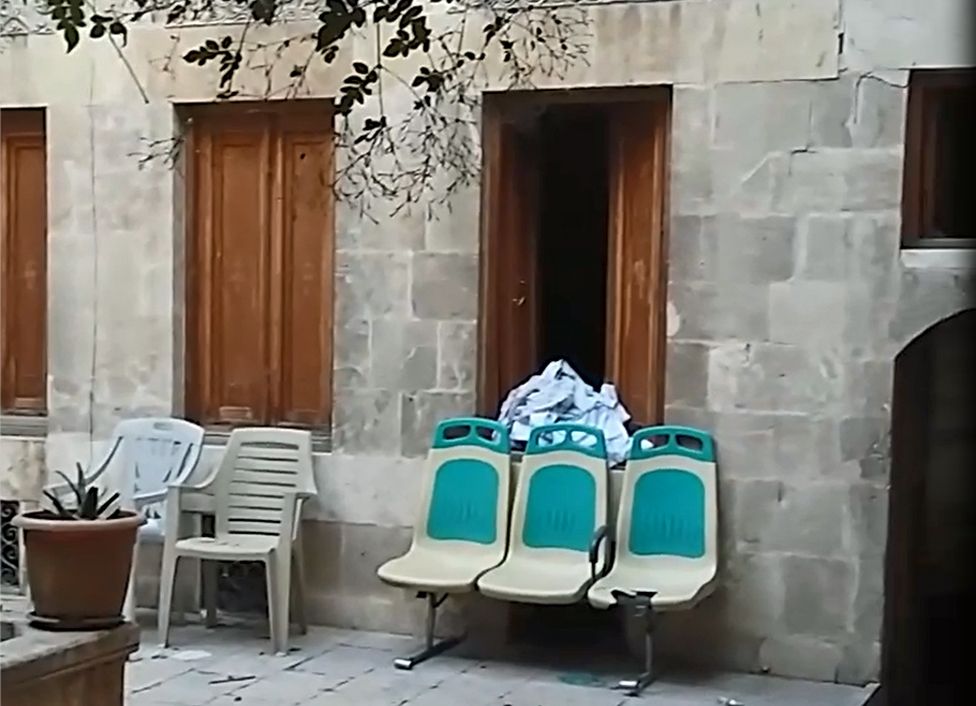
One of the rooms opening on to the courtyard became a treatment room with X-ray machines, another a recovery room. He managed to squeeze nine hospital beds into the cellars.
Thanks to financial support from aid agencies, all medicine was distributed free.
Abu Ahmed found himself working long hours every day of the week, playing the roles of doctor, ambulance driver and pharmacist all at once.
"Every day was stressful," he says.
"People had injuries from shrapnel, some had internal bleeding, even some amputations. Sometimes people were brought to me already dead with sniper wounds in their head.
"Sometimes I used to have panic attacks. When you see that things are getting worse and there's no solution ahead, you start wishing for death but fail to find it. I saw many cases where I couldn't do anything to help. What can I do except stem the blood, soothe the pain?"
Judaydah suffered frequent bombardment.
"One time it was late afternoon, there were maybe 10 patients with me," he says. "I heard jets hovering above. I took my patients and we ran downstairs to the cellars. We barely got there before the strike hit.
"The whole house shook, there was dust, rubble, broken windows. We couldn't see anything. After about 15-20 minutes we started checking up on each other. Calling out our names to see if we were all still there. Thankfully everyone was okay."
The rocket had missed them by metres, but the house next door was completely flattened.
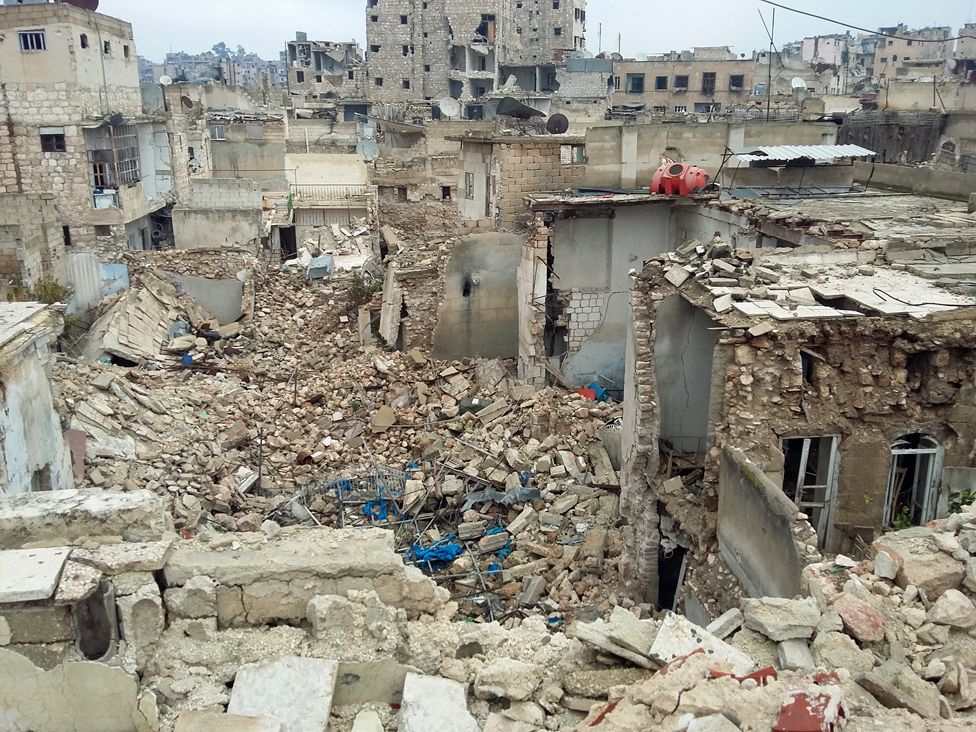
On one occasion a children's party was held in the courtyard, with silver tinsel streaming from the medieval arches, and balloons filling the fountain.
If only for an afternoon, Abu Ahmed and his salvaged house offered the young people living nearby - many of them orphans - a break from their daily ordeal.
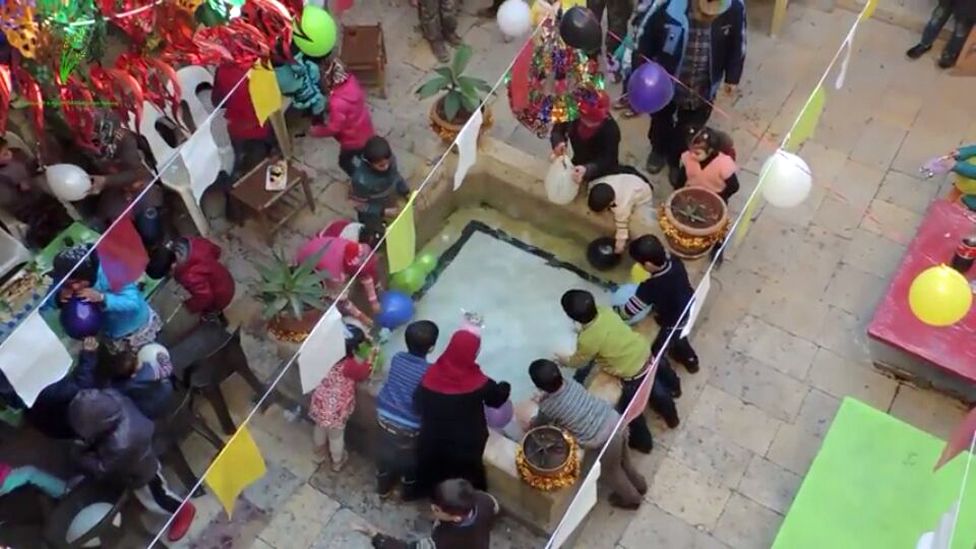
The old house also helped Abu Ahmed to experience moments of calm in his own hectic life.
"The most peaceful moment was at about five or six in the morning, just after morning prayers," he says.
"I would sit in the courtyard next to the trees, near the fountain, and have a coffee. I'd smell the jasmine, the honeysuckle, and the morning dew.
"Sitting that way made me forget everything I'd seen the day before. I would forget my nightmares. I savoured those moments."
Abu Ahmed's family remained in Aleppo, but in a quieter area. It was difficult for them to meet and eventually the pharmacist married his second wife.
One consequence was that in late 2016, when Aleppo was under intense siege, his new wife gave birth to a baby girl. It was a moment of intense happiness, Abu Ahmed says, but as both mother and baby were malnourished they were kept in hospital - and on their third day there it was bombed.
Fortunately they were unhurt, but it was too close for comfort and Abu Ahmed took them back to his medical centre in Judaydah.
"I cared for her myself," he says. "When people ask me how I managed to have a baby girl under siege and keep her alive, well, I really don't know. God was looking out for us."
They remained there, in rebel-held Aleppo, right until the end of the siege in December 2016.
"It was winter, and cold and there was no food either," Abu Ahmed remembers. "It got to a point where people would knock on the door at night asking for a piece of bread or a handful of flour. People stopped caring about the bombardment. They said, 'If I die, I will find peace.'
"Emotionally everyone was broken. Every second you lived was more difficult than the one before. The situation was desperate and we had to get out."
Abu Ahmed borrowed a car from a friend. He took his first family to safety and then returned for his second - his new wife and baby daughter, Leylas.
"That journey was hell. We left after sunset in the last convoy out of the city," he says.
"At one point a missile hit the road right in front of us. There was dust everywhere. I had Leylas in my arms. We were shaking, but we were alive. All we could do was brush off the dust and keep moving."
Once the government retook eastern Aleppo in December 2016, Zahed Tajeddin was finally able to return.
He found deserted streets and smashed buildings, rubble and wreckage everywhere. Many familiar places - his tailor, his barber, a nearby school and mosque - had been destroyed.
His house remained standing, but in the few days that separated Abu Ahmed's hurried departure and Tajeddin's return it had been ransacked and looted. Even the kitchen taps and an iron bed frame had been stripped away.
Among the debris Tajeddin spotted family photos, old letters, childhood paintings.
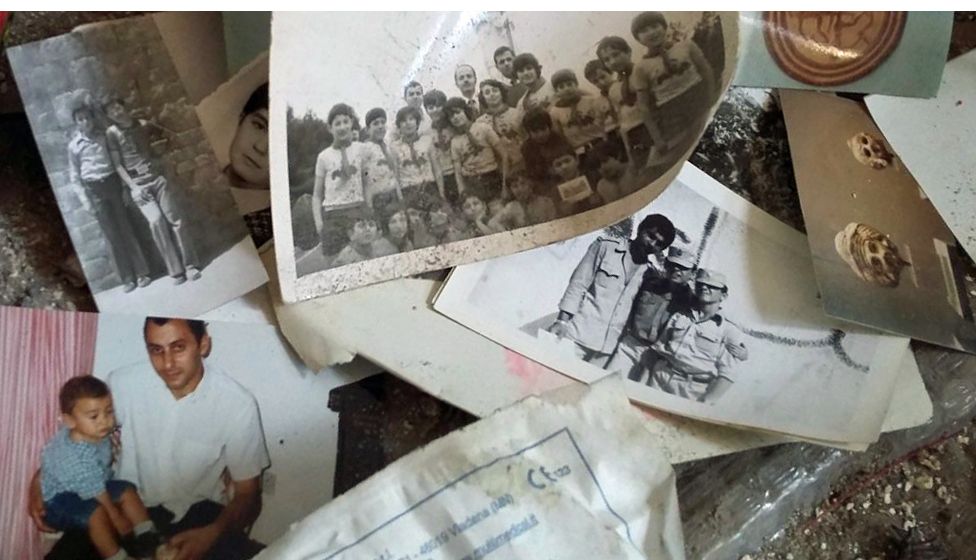
In places, piles of medicine also littered the floor.
"I went in and it was complete chaos. It was like doing my own archaeology," he says.
"It's very grim now, but the house - the walls, the courtyard, the plants, honeysuckles and one jasmine tree - it's still there."
Tajeddin has locked up the house now and is unsure if, or when, he'll go back.
Abu Ahmed is still in Syria, living in another city with his two wives and five children. He is trying to set up another pharmacy there, but he misses the city of his birth.
"My everything is in Aleppo," he says. "The best moments in my life I have spent in Aleppo. Bittersweet memories. But even in the darkest days, even under the bombs, I'd rather live in Aleppo than anywhere else."
As Tajeddin left the locked house in Judaydah on his last visit he passed the jasmine in the courtyard.
"It was winter so the jasmine was overgrown," he says. "It was still green, and do you know funny enough before I left, I saw a flower blooming. I think there was the first flower."
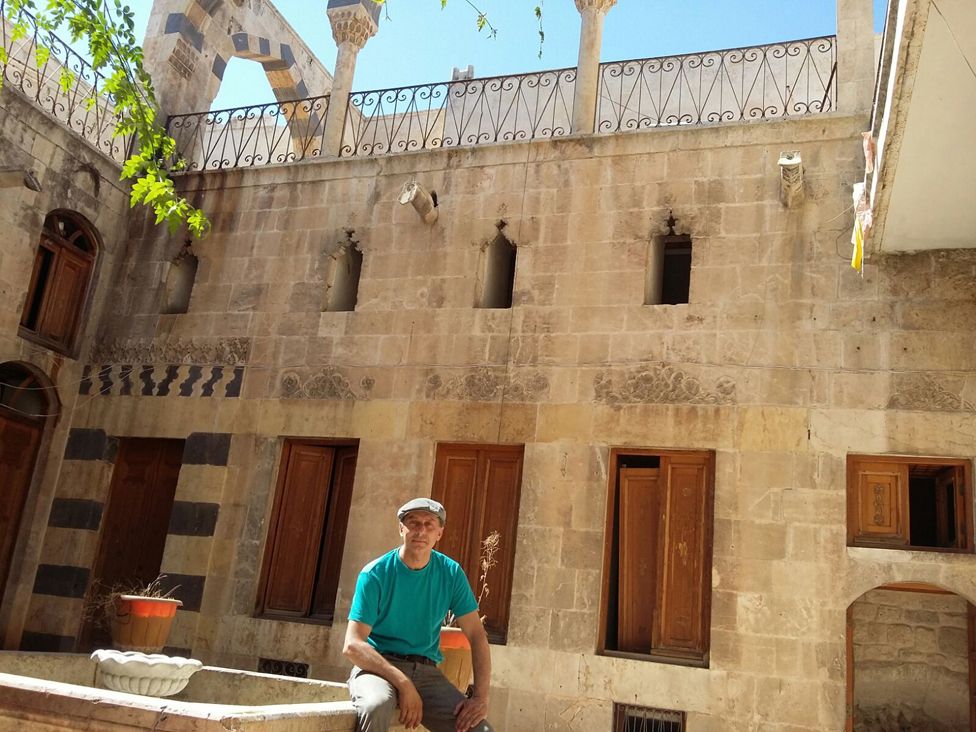
















Comments About This Article
Please fill the fields below.